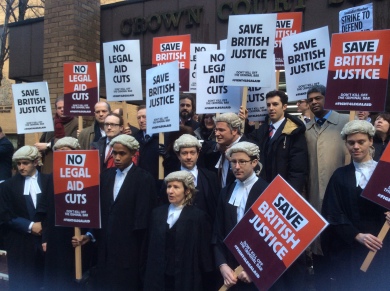I will be voting No in the CBA ballot, that is, voting for an acceptance of the deal to suspend direct action.
For those who know me, that may come as somewhat of a surprise. Why? Because I am one who has always believed that action works. There were those who said that our approach should be one of engagement alone. I was not amongst them. When I wrote my first call to arms piece back in early October “Do you hear the people sing” I received a text from my brother reminding me just how well it worked out for those who climbed onto the barricades in Les Miserables. I ignored it. I walked out on one part heard trial during the first half day of action and failed to turn up to the first day of trial on the second. I helped draft the No Returns protocols, spoke about it in front of solicitors, analysed the results monitoring its impact and answered the many queries that came to the CBA hotline during the 3 weeks that it was effective. I was elected as an officer of the CBA under a manifesto outlining my intentions to fight. Let me reiterate, I believe action works. I believe that pressure can be brought to bear on politicians to change their mind.
I also am one who recognises that the fight is important not just because of fees. This has never been just about money but rather to protect access to justice. The fees we are paid though are inextricably linked to that. Justice is not protected when those who practice within the system are a small, non diverse grouping of wealthy individuals who can treat it as a ‘hobby’ profession and not be reliant on it for its income. Justice is not protected when huge swathes of solicitor firms go under leading to advice deserts, when client choice becomes an illusion due to the fact that there are only a few firms against which such choice can be exercised. Justice is not protected when fees are so low, that monsters like G4S and Stobbarts Law enter the marketplace and inevitably cut corners to make profits.
The mantra ‘the solicitors fight is my fight’ is true to the extent that each side of the profession is helping protect access to justice through their efforts in fighting to overcome or reverse the Lord Chancellor’s reforms. The methods they are adopting may be different, but cuts which drive people out of the profession will damage everyone. The end-goal, to protect justice, is the same.
Having set out that I believe the solicitors fight is my fight, it may shock many to hear that I wish to accept the Lord Chancellor’s deal. I do so for 4 reasons. I believe it is a good deal. I believe whilst it may not be the best deal we could have got, it’s so close to being so as not to be worth the risks of continuing action. I believe that to refuse it would irrevocably damage the CBA’s credibility and neuter us in any future negotiations and finally and perhaps most importantly, I believe that accepting this deal does not equate to abandoning our solicitors. Let me expand upon each of those reasons.
Is it a good deal?
On any objective analysis the answer is yes.
On AGFS, the work which affects most of the bar and a good proportion of HCAs, cuts are deferred to the Summer of next year. The date is significant for two reasons. Firstly, because it falls after the next election. Secondly, it falls after a number of independent reviews will have reported their findings. The arguments as to ways alternative savings within the CJS can be found are powerful. The reviews will highlight them. I believe those arguments can be won.
There are those who argue that no government can be trusted and deferred cuts will simply be introduced later. This will not have been a successful appeal but rather a stay of execution. For myself, I consider that whatever government we have following the next election, we are certain to have a different Lord Chancellor. Would whichever incumbent we face wish to kick off his new political career by starting where Mr Grayling finished? With bewigged barristers marching in the streets and the courts brought to a standstill with actions like No Returns? Is it not more likely that the cuts will vanish, never to be seen again, that the new Lord Chancellor can use the fig-leaf of the independent reviews to save face and reconsider matters afresh in light of such new evidence. If I am wrong, what of it? We go back to the streets and re-erect the barricades. We have shown not just the government but more importantly ourselves, that action can work and it’s a tool in our armoury we can utilise again should the need arise. I also draw strength from the fact that I cannot think of many cuts that once introduced, the government later rescind. That was why it was so important for me to win before cuts were introduced, rather than fight to have them overturned later.
For VHCC’s it is not such a good deal, but it is far from bad. The CBA have not been directed to tell people to go back to work, nor could they if they had. VHCCs remain subject to anyone’s own individual desire to do them. In 1989 a junior would have been paid £100/hr for a complex VHCC. 19 years later, a QC would be paid £94.50/hr and a junior just £61/hr. Following the cuts in December a QC will be paid just £63.70/hr and a junior £42.70. The battle for VHCCs is not lost, it is just not yet over. It is ironic that it will be market forces which will determine whether VHCCs get done and it will be market forces which prove the undoing for a market economy led Tory Lord Chancellor. I am confident that no one will work at these rates and as such, when the Operation Cotton timebomb blows up in just over 2 weeks time, when no counsel can be found to do the case, that is when the VHCC battle will start to be won.
Is it the best deal?
Here, I would have to say no. The circumstances in which the deal were offered were shabby. The timescale for acceptance outrageous. The requirement that it be accepted in secret, without permitting for consultation or debate as to the merits of it, a scandal. That is good evidence that Mr Grayling was on the ropes, that the deal might have been rejected and something better put forward.
One must apply caution, however, in distinguishing between process and end result. That the circumstances in which the deal came to be offered were shabby does not mean the deal itself is. We have now been given the opportunity to focus only on the end result and we must do so. That something more might have been achieved does not mean one ought not to look long and hard as to the merits of what was offered. When I revisit previous Monday Messages the demands have been constant: No to cuts and to consider the independent reviews before acting. To all intents and purposes, this has been achieved.
It may be that something else could have been offered but if so, I have trouble articulating what that might have been.
Future CBA Negotiations
The battle is far from over. 2 weeks ago I had 9 court hearings and 2 conferences in one week. Because of no returns the courts were accommodating in moving the hearings for my convenience. Typically I was traveling from one court centre to another, each and every day. There were 6 sentences, 2 PCMHs and a mention. My income for the week was £0. Had the no returns not been in effect and I unable to attend my own hearings, they would have been returned and I be £900 out of pocket on the week, due to payments made by me to other counsel. The travesty that are freebie hearings continues. The outrage that we pay to work goes unnoticed. There is much left to argue for and the battle continues.
For these reasons I consider it essential that the CBA remains a strong and unified organisation capable of negotiating on our behalf. How much credibility can it have if, when having been given almost everything it asked for in negotiations, it turns round and shifts the goalposts by making new demands?
People complain about dual contracts and the need to fight to oppose them. I accept such a need. If we are to negotiate to overturn them, the negotiating body needs to be seen as credible. By refusing the deal offered, we will not be.
It is a sad fact that hitherto, the CBA had never been negotiating to remove the introduction of dual contracts. Perhaps it should have been but it was not. Their imposition will affect the bar, but it was not part of and has never been part of the negotiations with the MoJ. That must change, but I do not believe one can start laying new demands in a negotiation once the other side has given you what you asked for.
Does this deal abandon solicitors?
This is the most vexing of all questions. I understand the argument regarding dual contracts. It runs thus: If dual contracts are imposed, solicitor firms go bust. It then would matter not if cuts are deferred as those solicitors which remain will be compelled to keep advocacy in-house to bolster failing profits. If they keep advocacy in-house then work to the bar dries up. In such circumstances cuts are irrelevant as work won’t be being received by the bar upon which any cuts could bite.
There are those who argue that such an argument doesn’t necessarily hold. I am not one of them. I agree with this chain of logic and am fearful that it may come to pass. Where I disagree is that by taking this deal the bar abandons solicitors to such a fate.
What the recent action and No Returns has shown is that governments can be made to change their mind in the face of pressure. The solicitors can learn from this. Make no mistake about it, should solicitors choose not to attend Magistrates courts or police stations for 1 week, the system would grind to a halt and further negotiations on previously ‘set in stone’ two tier contracts would no doubt be back on the table. I have heard that this cannot be done due to fears of losing contracts. Similar fears arose when prosecuting counsel walked out of court in days of action, wondering if they would ever be instructed by the CPS again. Defence counsel wondered if they would be forced to pay wasted costs, or be struck off for walking out on clients. How is the position any different? If the bar had to fight for the solicitors because they could not, it would be one thing. Where the bar is being asked to fight for solicitors because they will not, it is entirely a different thing. One must also ask, for which solicitors are the bar being asked to fight? Not for the BFG who welcome the reduction in contracts and not for those who have voted to accept the new cuts. How are the bar realistically meant to demand of a government that they rescind cuts to solicitors when those self same solicitors have chosen to work at such new rates?
This is not a counsel of despair. In recent days, it seems that the solicitors recognise that they must fight themselves to stop the imposition of two-tier contracts. By the recent protocol introduced by the CLSA and LCCSA it seems they are starting this fight in earnest. They are upping their game and I shall be assisting in any way I can. Nothing in this deal prevents any of us from choosing to reject a brief from any solicitor. I am not abandoning the solicitors by voting to take this deal. I support them and will continue to support them.
Conclusion
The junior bar is in a fragile state. People were forced into bankruptcy or leaving the bar before this round of cuts was even proposed. I have no doubt that had the cuts been introduced in June that process would have accelerated. Accepting this deal protects their position in the short term. It strengthens the CBA and allows it to continue fighting for them in the long term. I have no wish to see firms of solicitors go to the wall. I also do not wish to sacrifice the junior bar because of the misconceived notion that solicitors cannot fight this action without the bar. They can. I hope they will and when they do so, I shall be supporting them in their efforts.
The sad fact is that if this deal is rejected, then one would be trading an uncertain future for solicitors against the certain death of the junior bar. By accepting it one accepts the immediate survival of the junior bar alongside an uncertain future for solicitors.
The deal is a good deal. I shall be voting NO as I wish to keep the deal.



